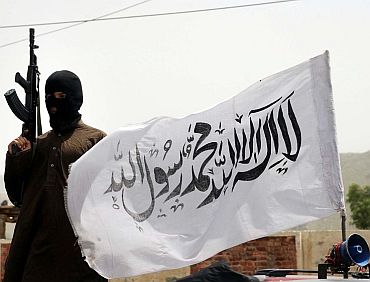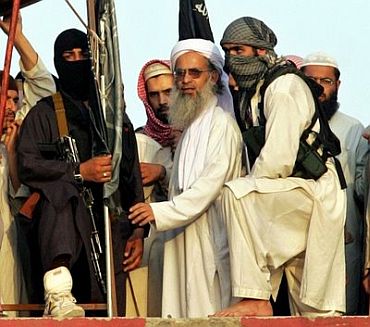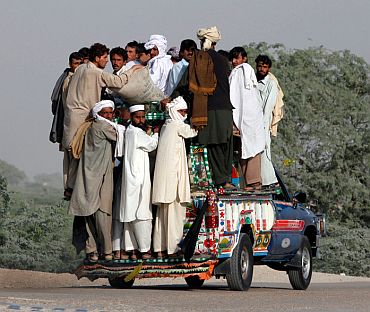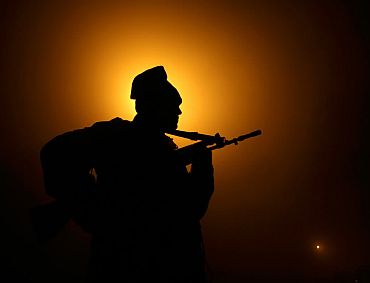Photographs: Reuters
China's influence on an 'unstable' Pakistan will grow further and the military and nuclear nexus between them will deepen in the coming years posing security concerns for India, a leading think-tank has said.
"In an unstable Pakistan, Chinese influence will grow further... The Pakistan government and the army will become even more dependent upon China," the New Delhi-based Institute for Defence Studies and Analyses has warned in its report.
The think-tank also said, "India has to be mindful of the growing Chinese influence in Pakistan-occupied Kashmir..."
The 156-page report titled 'Whither Pakistan? Growing Instability And Implications for India' said: "it is very much likely that agencies in Pakistan will continue with their present strategy of using terror as a tool of pressure against India."
...
The Chinese threat
China's state-run media recently reported that Beijing will go ahead with financing the construction of two 650 MW nuclear reactors in Pakistan disregarding the concerns raised by India and the United States.
China also vowed to take its "all weather" military ties with Pakistan to a "new high", as the two countries are collaborating in the manufacture of advanced fighter aircraft.
The report suggests a set of policy alternatives for India to deal with the consequences of an unstable Pakistan, on a long-term basis.
The report said that an increasing unstable Pakistan may manifest in several ways -- Lebanonisation (being divided into several small pockets) or in the worst-case scenario it may even face disintegration.
Lebanonisation of the Pakistani state
Image: File photo dated March 8, 2007, shows radical Pakistani cleric Abdul Aziz (2-R) surrounded by guards as he stands on a roof of the Lal Masjid or Red Mosque during a protest in Islamabad"There are important minorities in Pakistan that may together with the Barelvi Muslims constitute the majority. If such group engages itself in a bloody struggle with the Taliban, it may lead to a Lebanonisation of the Pakistani state," the report said.
Recently, the Taliban militants have targeted several Barelvis, Shia and other minority sects' places of worships.
In most recent attack, two suicide bombers targeted the Data Darbar Sahib shrine of Hazrat Ali Hajweri, considered the patron saint of Lahore, on July 1 that killed 45 people and wounded over 200.
If the infighting within the nation continues, the report warned then "multiple centres of powers will emerge with the army being the most important."
'Pak army will get more aggressive'
Image: File photo shows residents fleeing a military offensive against the Pakistani Taliban enter Dera Ismail Khan from South Waziristan on October 19, 2009The report said that the Pakistan army's behaviour might become unpredictable due to a variety of factors including the increasing radicalisation of a section of it.
"The army will get more aggressive as it finds itself fighting to save Pakistan: and its own identity. This could result in more sabre-rattling and brandishing of the nuclear threat," it said.
"Within Pakistan, the society will get fragmented. The ethnic, linguistic and provincial fault lines may get accentuated. Insurgency in Balochistan might get worse. Sindh and NWFP will not remain unaffected. They will challenge Punjab's dominance," it said.
The people in Gilgit-Baltistan, who have suffered at the hands of Pakistan in the last six decades, look towards India with some hope and expectation considering that India regards these areas as its own part.
'India should open links with Pak military'
Image: A paramilitary trooper patrols near the fencing at the India-Pakistan border at Suchetgarh, 30km south of JammuNoting that ever since the Indo-Pak war of 1971, the Pakistan army has for the first time come under serious domestic and international pressure to perform, the report said that the military campaign undertaken against militants in the country's tribal areas so far demonstrates that it is yet to evolve a well-thoughtout counter-insurgency strategy.
"The Pakistan army simply lacks the concept to fight counter-insurgency operations and continues to treat these operations as low intensity conflicts," it said, noting that the military outcome so far has been that it still continues to fight in Swat and South Waziristan, and has yet to make decisive inroads into North Waziristan.
The Pakistan counter-insurgency campaign has failed to address the broader grievances of the local population, and its perceived alignment with the US has constrained its strategic and tactical options, the report said.
The report suggested that India should open its links with the Pakistani military and a structured dialogue would help New Delhi understand the army's point of view.






article